#labor notes
Explore tagged Tumblr posts
Text


As the labor question is steadily and rapidly increasing in recognized importance, every effort should be made to place its “social solutions” upon a thoroughly scientific basis. One of these “solutions” relates specially to the true and ultimate system of currency. I have just received from some unknown friend, probably the author, a small pamphlet entitled “The Labor Question: what it is, method of its solution, and remedy for its evils,” by Charles Thomas Fowler. In it Mr. Fowler says, with great terseness of expression and with truth, that “the birth of the first bill of exchange was the death of the last specie dollar.” Bills of exchange, bank checks, and negotiable paper of all sorts add just so much to the body of the currency; and this issue is unlimited by law, and unlimited in fact, except by the exigencies of trade.[1] They are just as really currency as the specie dollar, the greenback, or the bank bill. A field which has no fence upon one of its sides is not fenced in, no matter how high and strong its fences may be on the other sides. So, the volume of the currency is not, in any true sense, limited by prohibitions of free banking, by a return to specie basis, or by any other means, so long as negotiable paper can be freely issued by individuals; and this free issue of negotiable paper is too useful, and too well intrenched in necessity, ever hereafter to be interfered with. Commerce can be hindered and trammeled to some extent—it may even, for a time, be seriously disturbed—by statute arrangements claiming to regulate the currency, whether by restrictive measures, or by flooding the community with over-issues; but the volume of the currency can no longer be adjusted by such means.
There is, it is true, a certain temporary advantage in the specie basis, simply because it is traditionally believed in, and beliefs or ideas enter into the question of the stability of values. This fact is felt by the advocates of a specie basis. They, and others, would not have so much of the sensation that “the bottom is all knocked out,” if we could return to such a basis, and that confidence would go for something. On the other hand, the sole alternative, so far as seen by the advocates of specie basis, is a fluctuating and limitless issue from time to time of government paper money, with no other regulation than that of an ignorant and changeable public opinion, operated by interested political and financial agitators and wireworkers. Such are the grounds of the honest advocacy, so far as it is intelligent, of a return to a specie basis.
On the other hand, the advocates of paper money and expansion have their side of the truth. They see or feel the fallacy of the claim that specie basis really means any thing but an illusion, knowing as they do that gold and silver are real commodities rising and falling in value along with all other commodities, and that they will in no event make the whole volume of the currency, but will be only a fixed factor—in so far as fixed—along with other changeable factors in the composition of its total volume; a fence upon one side of a field which, on some other side, is an open common. They also see or feel that the best currency would be such as should have some kind of adjusted elasticity, or an expansive and contractile quality, adapted to the fluctuating activities of trade, of which currency is the instrument; and, in fine, that government might, if it knew enough and were honest, subserve by its conceded powers this demand for an adaptation between the needs of trade and the appropriate supply of its instrument.
But, on the one hand, the supposed stability resulting from a specie basis is a mere illusion, and one which is fast being found out and exposed, while the remedy offered by the opponents of a specie basis is not, in fact, the only alternative; and, on the other hand, no existing government does know enough wisely to regulate the currency, and, as a rule, existing governments are not honest.
The political issue about finance, now coming to the front in the United States, and in a degree in other countries, is, therefore, on neither side intelligent or wholly well-intentioned, while yet, on either side, representing something of the truth. The discussion and agitation are, nevertheless, to be hailed as among the most auspicious signs of the times. They signify politics become educational—electioneering a university training-school for the whole people. The community may have to pay dearly for its instruction before it is through with this new war of ideas ; but the right knowledge of the subject will be ultimately evolved, and the war itself will be the opportunity of the true teachers.
I have said that government paper is not the only alternative of a specie basis. It is, however, the only one to which much attention has been given; and the other—that to which I wish to call attention—will need to be carefully elaborated and described from time to time to make it clearly apprehended as, in fine, the science of the subject. I mean a currency and a system of banking based directly on labor and, in a sense, self-regulating; that is to say, regulated and administered by individuals, or by the people themselves, without let or hindrance, without interference or prescription from the government; although beneficent adjustments may possibly take place between the action of the government and this labor system of free banking.
The object of the present essay is not, however, chiefly to define or describe either currency in its specific details, or labor banking as a system. It is rather preliminary to those considerations, and will be confined in a great measure to the simple ascertainment of THE UNIT OF LABOR, which, when ascertained, may be taken as the dollar of the Labor Bank.
Every system of thought, every science which is accurately constituted, has what is technically called its unit, its starting-point, that from which all its investigations take their departure, and to which they recur as regulative of them all. Thus the unit of arithmetic is the numerical unit, or the number one; the unit of geometry is the point, or minim of length; the unit of weight is the pound; the unit of long measure is the foot; the unit of mechanical force is the foot-pound; the unit of mechanical power is the horse power; and the unit of resistance to the transmission of electricity is the ohm. The following definitions are furnished me by Prof. P. H. Van Der Weyde:—
A foot-pound, the unit of force or of work, is one pound weight lifted one foot high against gravitation, the gravitation taken at the surface of the ocean at forty-five degrees latitude. The latter two considerations are, however, practically neglected. The element of time in which the work is done is here left out of the account.
A horse power, the unit of power or of the amount of force exerted or work done in a given time, is thirty-three thousand foot-pounds per minute; that is to say, thirty-three thousand pounds lifted one foot high per minute, or three hundred and thirty pounds lifted one hundred feet high per minute, or five and one-half pounds one hundred feet high per second, or fifty-five pounds ten feet high per second.
A man power is one-eighth horse power; so that a man may lift seven pounds ten feet high per second, or four hundred and twenty pounds ten feet per minute, or four thousand two hundred pounds one foot per minute, or seventy pounds one foot per second.
The French unit of force is the kilogrammeter, one kilogram lifted one meter high, or seven and two-tenths times our unit of force. A kilogram equals two and two-tenths pounds; a meter equals nearly three and one-third feet. A French horse power is seventy-five kilogrammeters per second.
The ohm has been accepted by the British Association as the unit of resistance in telegraph wires and other conductors of electricity; and as the strength of the battery power must overcome such resistance, it has at the same time become the measure of battery strength. The ohm is the resistance which an electric current undergoes in passing through one-tenth of a mile of No. 9 iron wire.
The French unit of electrical resistance is that of one meter of mercury contained in a glass tube of one square millemeter section.
These definitions are introduced here for the purpose of showing the pains-taking accuracy with which the student of mechanics determines his units of measurement,—with which, in other words, he establishes standards, or measures those things by which other things are to be measured,—and to emphasize the statement that Radical Political Economy, or, so to speak, this branch of Social Mechanics, will begin to be rightly constituted as a science only when we shall have established, with equal accuracy, the unit of labor. Unless the measure itself is measured, there is no accuracy, no certainty, no scientific result.
By the science of Radical Political Economy I mean the science of the laws of price-bearing wealth, as wealth should be produced and distributed in order to secure the absolutely equitable exchange of labor and commodities.
I say Radical Political Economy, because ordinary or current Political Economy inquires, rather, into the laws of wealth as it is in fact produced and distributed, with only such suggestions of improvement as do not affect, radically, the present system. I say price-bearing wealth, because there is much wealth which is, or should be, unpriced or priceless; which does not, or ought not, therefore, to enter into commerce at all, in the ordinary sense of commerce. The blessed air of heaven, the affection we bear to lovers, children, and friends, have in them a world of wealth to those who receive them; but they are, or should be, a free gift, uncalculated and unmeasured by price, definite estimate, or equivalent. Our affections are degraded when they are reduced to the level of price-bearing commodities. It is only, therefore, price-bearing commodities which are the subject-matter of Radical Political Economy.
All price-bearing commodities—all, that is to say, which are rightfully such, or which should be such—are the products of labor; and it is the amount of labor concreted in the commodity which is the true measure of its price,[2] This labor is sometimes called labor-cost, or the cost in labor of producing the commodity; and it is then said that, from the point of view of Radical Political Economy, COST IS THE LIMIT OF PRICE. The principle is the same if the price is put directly upon the labor, without awaiting its concretion in a commodity. Hence it follows that, in order to obtain the true measure of cost, and so of price, and so a true standard of exchange or trade, i. e., a true dollar as the unit of trade,—all these being now identified with each other,—we must first ascertain, or in some way determine upon, the unit of labor.
The first and simplest suggestion, in the inquiry after a unit of labor, is the day's work. The hour's work is an important fraction of the day's work, but it is not so naturally the unit as the day's work. The day's work is, it will be found, virtually the labor dollar, and the hour's work accords rather with the dime or bit. But a day's work is, as the matter now stands, too indeterminate to serve as the scientific measure of something else supposed to need measurement.
Work of any kind, in order to be accurately and completely defined, must be determined in three aspects:—
First, as to the length of time;
Second, as to the degree of its intensity or severity;
Third, as to the degree of acquired skill, or ability previously accumulated by other work preparatory to the work now in hand; and as to certain other minor considerations.
The day's work, to be made standard, and to serve as the labor dollar, or the instrument by which all other work may be measured or estimated, must, therefore, be itself defined in all these three particulars.
First, as to the length of the standard day's work. We may take for this purpose eight hours. It is not necessary to insist that this is inherently the true limit of the working day, though much has been said, and may be said, in favor of the division of the day of twenty-four hours into three equal parts,—one for work, one for sleeping and eating, and one for study and recreation. It suffices for our purpose to adopt this period,—arbitrarily, if you will. Certainty is all that is necessary. The “meter,” the scientific yard, serves sufficiently well to measure cloth, whether it be precisely ascertained to be the ten-millionth part (which it is intended to be) of the earth's diameter, or not.
Next, in respect to the severity of the work; and I am here especially indebted to Mr. Fowler for introducing the term intensity, Josiah Warren, recognizing that the character of the work is an element of the problem, used the phrase “the amount of repugnance overcome” to denote the degree of hardship or burdensomeness of labor. The expression is accurate, but, like his pounds of corn as a device for measuring labor, it is cumbersome; and the idea is, for most purposes, better expressed by the simple word intensity. There is another reason why the introduction of this term, as a technicality for the purpose, is important, and fairly entitles Mr. Fowler to claim to have enlarged and improved the technical machinery, in this particular, of the science of Radical Political Economy. I was never satisfied with the moderate degree of success which Mr. Warren—or myself, in my effort to expound Mr. Warren's ideas on this subject twenty-three years ago (see “Science of Society”)—had achieved in attempting to make clear the nature of, and mode of measuring, the elements of work other than the time occupied. I struggled with the difficulty at the time, and have always felt that I partially failed. It is Mr. Fowler's use of the term intensity in this connection which has stimulated me to this renewal of the subject.
The special aptness of this term for this purpose, and the reason why I deem it so important, will appear from the following considerations. Continuity in time, mere forth-stretching in the given direction, is called by the philosophers Protension (forth-stretching); a stretching outward and around in all directions, as in space, is called Extension (out- or from-stretching); and the energy of effort, by which things are, as it were, drawn in upon and by the centering personality of the actor, is called intensity (in-stretching). What we are dealing with is a department of measure—the measure of labor, cost, and price; and the metaphysicians have pointed out that these three modes are the only three possible requisites of complete or exhaustive measurement; so that we may, when we have thoroughly applied them, rest assured that, by such recurrence to first principles, we have scientifically compassed the subject. Hickok, for example, in his “Empirical Psychology,” expresses this proposition in these terms: “No quantity can have measure in any other directions than extension in space, duration in time (protension), and intensity in degree; and when an act of attention has stretched over the limits filled by the distinct quality in all these several directions, it has determined it in all the forms which any quality can possess, and made it to be known definitely in all its measures of quantity.” The subject we are investigating is the quantity of labor; and the question is: Of what does it consist in these three possible modes of considering it?
In respect to time measure, the protensity of labor, we have said all that is requisite at the moment. In respect to its intensity or severity we have ascertained that this is also a proper element of the standard day's work, and so of the measure of all work; and we must now inquire by what standard it can itself be measured or estimated, and how, practically, the standard can be applied. The subject is confessedly a difficult one. All sorts of people put all sorts of different estimates upon the relative intensity or severity of all sorts of different labor. It may almost be said that no two agree upon any point touching the subject. But fortunately science is now sufficiently advanced to teach us how to overcome this difficulty. The statistical and other branches of science have familiarized us with the method of general averages. It is possible to tell with proximate accuracy how many persons will commit suicide next year in London, Paris, or New York; and even how many will choose the razor, how many the rope, how many the pistol, and how many drowning, as the means of effecting death. It will be found possible, in a similar way, when the world wishes to know, to ascertain how many women think washing harder work than ironing, and how many think the other way; and how many men would prefer to work out of doors, and how many under shelter. All these statistics of the details of human labor, and of the estimates which men and women make of the desirableness and undesirableness of every given pursuit and condition, will in the future become subjects of science, and then of practical every-day knowledge and utility; and the labor dollar, then having come into use, will furnish the unit of all such calculations. In that future when equity shall give labor its own, the modes of rightly apportioning the burdens of life will be studied with intensity, and there will be found nothing insuperable in the nature of the problem. The first great step is to convince the minds of men of the desirableness of such knowledge.
It should be borne in mind that, when exchanges of goods shall be made in accordance with a known law of equity based exclusively upon labor-cost, trade secrets, being no longer of any advantage, will be abandoned, and all knowledge of all trades will be thrown open to all people. There will then be greater facility among men for changing their occupations, and for gratifying their tastes in their pursuits. This change will also enable people to know far better than they now know what labors they really like best, and are willing to do at the cheapest rate. There will then grow up a legitimate labor-market, and all kinds of labor and products will be tendered at the minimum price as measured by the average estimate of the degree of severity of the labor involved in them. In other words, every act of purchase and sale will then be the result of the votes of two parties on the relative repugnance and attractiveness of the two varieties of labor involved; and the whole body of trade will be a continuous canvassing of all such questions. It is so now in part, and except that ideas are confused on the subject; that each party to every trade considers himself entitled to take advantage of the other, which is an illegitimate element—as much so in principle, as the sword or the slave whip thrown into the bargain; and that no labor dollar, and therefore no instrument of adjusting labor-cost, has hitherto existed.
Assuming, then, that by the prevalence of equity, or the true interchange of equivalents in labor-cost, we had a full supply of everybody's estimates of every kind of work in respect to its relative repugnance or attractiveness,—its intensity, in fact, as hard or easy work,—it would be easy to strike an average which should be very exact—the true par of labor intensity; all above that average being work of extra or plus intensity, or above par, and all below it being work of minor intensity, or below par. We have not, it is true, as the case now stands, the necessary data for establishing the exact par of labor intensity; for the world has not hitherto thought it worth while to study such facts. The best that can be done therefore, to begin with, is to assume an average which will approach in some measure to accuracy, and to go on constantly eliminating error and arriving at a higher decree of precision.
Everybody has some idea of what constitutes an ordinary or average degree of hard work. We may now, then, without attempting to fix the idea any more definitely beforehand, further define the labor dollar as a day's work of eight hours—of course whether male or female labor—of the average degree of severity or intensity. I think the bare abstract idea of an average, or par, is all that is needed, and that it is better than Mr. Warren's corn measure. We all know sufficiently well what we mean by “the usual degree of health," and do not have to add "as well as Mr. A or Mr. B;” and, if we should undertake to settle the matter more exactly in that way, we should most likely diverge at once into a discussion over the question whether Mr. A's or Mr. B's health was of the average degree; thus demonstrating that the bare idea of the average is more definitely fixed in our minds than the particular state of the health of any individual. This view does not, however, antagonize the previous suggestion that the extended and systematic observation of details will ultimately render the abstract idea still more definite.
If parties, in negotiating an exchange, regard their labor as of the ordinary degree of intensity,—which would occur in the great majority of cases, especially under the criticism of a worldful of appraisers,—that determines the point without further parley. If, on the contrary, one or both differ in their estimate from the average, that is matter of negotiation. If one too much depreciates his labor, it will become, with culture, under this system, matter of courtesy to insist on raising the estimate. While, then, ordinarily a dollar note will be paid for the day's work or its produce in a commodity, the price and payment may go up to a dollar and a half, or down to the half dollar, or may deviate to any other- degree, the dollar serving in every case as the unit of comparison,—as, in a word, the standard of labor-cost, price, and labor-value, which all come to be identical; value meaning in this case, not utility, but the buying-capacity of the dollar.
To illustrate: suppose a community reduced by any cause to the primitive condition of barter. Instead of the poor device of the shinplaster,—referring for its measure of value to the silver or gold dollar, which has taken its departure and is no standard,—let the labor note be substituted. Miss Smith undertakes the teaching of the village school. She will teach eight hours a day, and she estimates her labor as neither above nor below the average degree of intensity as hard work. This, then, being exactly the value of the labor dollar as above defined, Miss Smith charges one dollar—a labor dollar—a day for her work. She has an average of twenty pupils. For each pupil the parents become, therefore, indebted to Miss Smith the twentieth part of a dollar, or one half labor dime, or five labor cents, per day; and they pay her in their own labor notes, or in the labor dollars, dimes, and cents which have come into their hands from their trade with others. The labor money bills only differ from every body's individual notes written on common paper in the fact that the storekeeper or postmaster has got up his own notes in better style, printed and perhaps vignetted, and issues them in the place of the common written scraps of paper.' These he keeps in his safe instead, as his specie basis, they being the immediate representative of the labor of the village, so far as it is in market. As fast as the work promised is done, or its equivalent given in products, the notes are redeemed and cancelled, or re-issued, and the transaction is ended.
In this manner Miss Smith gets her entire pay in good labor dollars. These will command every body's work and buy every thing produced in the village. Dealing with the outside world involves an extension of the problem which will not be considered at this point. The school teacher may, in turn, to the extent of her credit, and wishing to anticipate returns, issue her labor notes, transmutable into labor dollars by the village banker —the postmaster or store-keeper, as before stated. In this manner she, and every one in the village, becomes a capitalist to the extent to which their neighbors have confidence in their future ability and intention to fulfil their promises; and so, able to create loan's for themselves at any moment to this extent; checked in the first instance by any lack of confidence on the part of the immediate neighbors, and then on the part of the village banker, who must have confidence also before he will receive the individual's labor note and replace it by his own issue. Thus a healthy and continuous vigilance will be exerted over this otherwise perfectly free creation of the labor bullion of our new banking system. Risk and actual losses will, however, occur ; but they will be reduced to a minimum by the natural working of the system; and the village banker will become an insurance agent to cover them, being allowed to increase the currency beyond the bullion in deposit the slight percentage found practically necessary to that end.
Apart from this percentage to cover losses,—which will be kept at the lowest, as it will be added under the immediate inspection of the whole village, each individual being constantly taxed his proportion of every loss,—the village banker is not to be allowed to issue a single labor dollar for which he has not the same amount of labor bullion—the labor notes of the people—in deposit; including, however, his own labor notes covering his services, and issued on the same terms as those of any other citizen. Every over-issue should be deemed a fraud, and prevented or remedied by well-devised checks upon the conduct of the banker,—such as numbers on the bills issued, reports and inspections of committees, etc.,—until confidence is so established as to dispense with unnecessary caution. The banking office will be open to competition in respect to the best management, like any other business. If a dozen bankers spring up in the village, no matter.
Another element remains to be added in the constitution of the labor dollar,—one which has been alluded to above, and then purposely postponed until now. This is what we will technically call the Extensity of the day's work,—an element which extends beyond, or goes outside of, the particular day upon which the work is to be done. This element is the acquired skill of the laborer, secured by previous labor fitting him to do the work; the wear and tear of instruments or tools of his own, which he brings into the work; particular risks of any kind assumed by the laborer, etc. This item is fixed also by averages and the mutual estimates of the parties contracting.
Prior labor giving skill is to be estimated upon the same principle as other labor; but, the cost being distributed by estimate to all who will be ever likely to avail themselves of the skill, it becomes generally a small item in the individual case: such as it is, however, to be settled by the estimates of the worker and employer, or tacitly covered by the general price demanded for the day's work. So with the other matters included under this head. All legitimate risks are legitimately covered by an augmentation of price.
It is a curious working of this equitable system of exchanges that, while acquired skill involving prior labor is an element of the price of labor, superior natural ability—“the gift of God”— is left wholly out of the account, and does not in any manner augment the price. This is a point which is more frequently than any other misunderstood, and which, when understood, is most likely to meet with objection from new investigators of equity. A little close attention to it, however, will remove all difficulty. It is undoubtedly true that superior natural ability does give a natural advantage, which the possessor may, if he will, and which at present he does, avail himself of in disposing of his labor. The question now is, however, whether he ought really to do so; or, in other words, whether the gift of Nature to the individual is something entirely for his selfish individual benefit, or something in which his weaker competitor especially, and the public at large, should participate.
It is certain that the principle of equity, as rightly defined,—the exchange of equivalent burdens, or of equivalent amounts of repugnance overcome,—gives nothing for that which costs nothing. The handsome woman degrades herself if she makes a charge for exhibiting her beauty. It is wealth to the world, as it is also to herself, but not price-bearing wealth; not an object of ordinary commerce or trade. Ought it not to be the same with superior natural talents and endowments of all kinds? On the race-course and in the prize-ring, where the object is—as here, in respect to equity—to neutralize all undue advantages, it is not merely the swiftest horse or the strongest man, pure and simple, who takes the prize. All advantages are first equalized by granting to the weaker party compensating advantages. The “light weight,” when pitted against a bigger man, has a due concession made to him on account of his obvious inferiority.
Should not laborers, in seeking equity for themselves, be ready to abide by the behests of equity throughout; when it works against, as well as when it works for, them? Should not the world's workers come to be as generous, as honorable, as just, at least, as racers and prize-fighters? No pugilist would call it a fair fight when a big fellow knocked down a little one merely because Nature gave him the superior ability; merely, in other words, because he could do it. No gamester would refuse to give odds to one less versed than himself in the game. Curiously enough, these are almost the only people who have ever been dealing with the question of what is fair play in any competitive engagement of man with his fellow. Ordinary political economy never asks the question, but only inquires to what extent, and by what means, the big fellows actually get the advantage; what are the laws and operations, in other words, of the natural tendency to advantage-getting.
In those departments of life where courtesy is established, there is no doubt on this question. If a weak woman burdened with a child is allowed to stand in a crowded place, and strong men sit at their ease, it is justly regarded as an outrage upon decency; and yet the strong men would only be availing themselves of their natural advantages.
In a word, on principle, the question is settled beyond all doubt that equity, in establishing prices, grants nothing on the ground of natural superiority,—therein concurring with the principles of fair dealing as understood in games, and of courtesy as understood in society. But still, with our present habits of thought, the verdict may seem a harsh one; and many persons will perhaps be more readily convinced if made to see that the principle will work well in practice, than by the mere sternness of the logic. This well-working of the principle is also readily shown. But first, let us conclude our definition of the labor dollar as the measure of radical equity.
The labor dollar is then, in fine, a vignetted paper representative,—or its equivalent,—signed and issued by a labor banker, of a day's work, of man, woman, or child, of eight hours' duration, of average intensity and average extensity.
The general aspect of the labor dollar may be similar to that of a current dollar bill more or less elaborately devised. Paper will be the ordinary material, although it would not cease to fulfil the conditions if some other available substance—as parchment for instance—were used instead. Its cost and the labor of signing, issuing, cancelling, renewing, etc., belong to expenses, and can be repaid to the banker, equitably estimated, along with all other labor.
A promise of labor to the same amount signed by an individual not a banker, not vignetted, etc., would pass under the more general designation of “a labor note.” Together, and with all accessory commercial paper of the same order, they would constitute the labor currency.
The labor notes of the people, in the safe or vaults of the banker, securing him in making his promises to render so much labor, or its equivalent in products, are what I have denominated labor bullion.
Trade or commerce conducted on this basis may be denominated labor trade; and the transactions of this trade, with the ruling rates for different kinds of labor, will come to be rightly known as the labor market; and the labor rates of every species of men's and women's labor, down to minutiae, will be regularly quoted.
The radical, indeed the revolutionary, difference between a currency based on this simple device and any previously existing currency may still escape the reader, unless he again reflects that the labor dollar means something defined, and therefore definite, and that the current dollar means something wholly undefined and indefinite. Consider the difference in this respect between a common token, such as a theatre ticket or a railroad ticket, and a paper, or even a silver, dollar. The token obtained to-day will purchase a seat in the theatre or the car to-day, tomorrow, or six months hence: that is to say, it represents a definite something, or, in other words, a fixed and ascertained purchasing-power. Not so with the dollar, whether paper or metallic. You may know what you can buy with them to-day, but what they will procure for you to-morrow, a week hence, or six months hence:,you cannot know, as their value may have fluctuated within any limits; in other words, they have no fixed or ascertained, or ascertainable, purchasing-power. The labor dollar has, then, the character of the fixed token, as contrasted with that of our present currency; or the character of a measure which is itself measured, as contrasted with an elastic yard-stick, or the hand or foot used as a pound weight.
In an article on finance by Mr. McCulloch, ex-Secretary of the Treasury, he says:
“There being but one universally recognized measure of value, and that being a value in itself, costing what it represents in the labor which is required to obtain it, the nation that adopts, either from choice or temporary necessity, an inferior standard violates the financial law of the world, and inevitably suffers for its violation. An irredeemable, and consequently depreciated, currency drives out of circulation the currency superior to itself; and if made by law a legal tender, while its real value is not thereby enhanced, it becomes a false and demoralizing standard, under the influence of which prices advance in a ratio disproportioned even to its actual depreciation. Very different from this is that gradual, healthy, and general modification of prices which is the effect of the increase of the precious metals."
What is here said of the relative fixedness of paper and metallic currency, which would be in a degree true if the comparison were with a currency to consist of the precious metals and nothing else—which is not pretended,—applies as a condemnatory criticism upon all systems of finance which exist or have existed; and the encomium can only be conferred rightly on the labor currency, which has the characteristics insisted on in a still higher degree than the metals alone would have them.
In the above definition of the labor dollar the day's work of a child is estimated at the same as that of a man or a woman. This will be apt to strike the investigator at first as erroneous, but he has only to recur to the principle to perceive that it is strictly accurate. The severity, or repugnance overcome, in keeping a child eight hours intensely at work, is almost sure to be as great as, and is most likely to be much greater than, that of so employing the time of a grown person; and by our principle, it is this severity endured which is to be compensated or equalized by the price paid for the labor. Such is, in other words, precisely all that price can rightfully mean.
What, in the next place, would be the working results of this principle upon the labor of children? Just this: as children's labor would have to be paid as much as, or more than, that of grown people,—except when employed at those light and pleasing labors which for them would resemble play,—no employer would engage children for hard and unsuitable work, except in cases of urgency or peculiar necessity; and then he would submit to compensate them appropriately, according to the principle. Children would then be, as it were, driven out of the labor market (except in the emergencies above referred to); which means, however, nothing more than that employers would prefer, if practicable, to secure the heavier and harder variety of labor when it was at the same time lower priced than the other; and secondly, that children would be thereby left free for acquiring education, and for play or untrammeled exercise, which is precisely what should happen. In other words, children and grown people would be relegated, respectively, by the working of a simple principle, to their true places,—a drift which would co-operate exactly with what is now the effort of wise and benevolent parents and guardians.
The case of children conducts us back to the question, reserved above, of the similar working of the principle in denying pay for superior endowments, which, as a portion of natural wealth, are by the theory non-price-bearing commodities. Here also it will be found that the effect is quietly to force every body—not now children alone—into their true places; being in fact, thereby, one of the greatest of social solutions. Under the principle, the best endowed and most efficient labor comes into competition with inferior labor in each special branch, not, as now, at a higher price, nor even at the same price, but absolutely at a lower price. Of course, then, it will force itself in, and force the inferior labor out. Let this be well understood. He who should have the greatest natural fitness for a particular kind of work, having greater facility in it, will—with some exceptions only—have also the greatest attraction or fondness for that kind of industry. His estimate of its intensity will therefore be less than that of other men. In other words, it will not be as hard work for him as for them, and, therefore, under this new principle, his price will be less. Of course, then, he will be preferred, and those for whom it is harder work or more burdensome will be set aside. The very best workmen will first be taken up by the employers; then the second best; then the third best; and, finally, and under necessity only, the poorer qualities; which, however, if called in, will be paid the higher prices, as in the case of the children. There is, even as matters now stand, a natural preference, of course, among employers for superior workmen; but this preference is nearly neutralized, and sometimes inverted, by the fact that such labor must have the largest prices; so that poor laborers are about as readily retained, and sometimes more so, than the superior ones, whereby the survival-of-the-fittest principle is defeated, and the general quality of products depreciated.
This paying of the best workmen the lowest prices upsets, of course, all existing notions. It is a difficult point both for unphilosophical and for selfish minds. It is, nevertheless, not only abstractly right, but replete with the best possible results. It is on the road to the reduction of all price to zero, or to the time when all labor shall be play, and shall be exchanged for love without price. But far short of this, and immediately, these results follow: 1. All labor will be performed—as a rule—by the best workmen and with the utmost efficiency, and, consequently, all products will be carried up to the highest excellence. 2. All prices will be brought down to the minimum, or to the very cheapest at which the labor, or the product, can be afforded —tending to place both necessaries and luxuries within the reach of all, 3. Every body will be gently and unconsciously forced into just those pursuits for which they are best suited, and for which they have most liking; in other words, Attractive Industry will be in a great measure realized. What could be asked for better than all this?
Upon this third point a word should be added. The inferior workman, forced out of an employment, may and often will prove to be the superior workman in some other; so that to be driven out of the labor market only means, in fact, being transferred to something better, until the whole world shall be employed at just that which it likes best to do.
A fourth result, perhaps the most important of them all, will be to substitute a PRINCIPLE for the settlement of prices instead of the system of universal higgling and overreaching which now prevails; a civilized and scientific, instead of a barbarous, method. If war may be defined as an inflammatory social fever tending to the surface, trade for profit, by bargaining, may be regarded as the low or typhoid form of the same, a disguised and diffused fever, a state of modified war of all against all. This greatest effect of equity would then be to substitute interstitial peace for a universal state of interstitial warfare in society, opening the way to all kinds of beneficent cooperation in the place of an antagonistic individuality.
It must not, however, after all has been said, be concluded that the mere operation of the principle, “labor-cost the limit of price,” will fulfil all the conditions of social harmony, and supply of itself the true social organization. It is simply a plank in the ship, or, if you will, the keel; but it is not the whole structure. Nor will it prove, taken alone, altogether satisfactory. A society constituted merely under the operation of this principle would, indeed, secure a genial and beneficent equity, but it would also lead to a certain dead-levelism of conditions which would lack an element of picturesqueness and variety which the human mind also craves.
Nobody could ever become very rich; but the level prairie, or the fertile plains of Lombardy, would prove dull, if the whole world had nothing else to exhibit. Security of condition and a sense of prevailing justice in life, while they are a basis of happiness, are only a basis. The human soul has legitimate aspirations for distinction, preeminence, largeness of individual environment, and the means of great and beneficent achievement, which may demand the possession of exceptional wealth of the acquired and price-bearing variety, as well as mere natural endowment. These aspirations the existing order of society does, to a considerable extent, gratify; but it does so at the expense of a general denial of equity, and of a consequent all-prevalent irritation, ending in the insecurity of the very wealth so acquired. Equity is, therefore, a question of method, of economy, and of security, as well as a question of the just distribution of wealth. The demand for some opportunity for larger acquisitions than are afforded by mere equity is, nevertheless, a true voice of the soul, and the supposition that the doctrine of equity completely forbids any such aspiration is one of the greatest hindrances to its acceptance. There is a secret repugnance to the doctrine left in the mind, despite the logical cogency which may compel an intellectual assent. This comes, however, entirely of misapprehension. It is not essential that a devotion to exact and technical equity should predominate in all human transactions. What the doctrine affirms is merely that, by bargain and traffic regulated by equity, large fortunes could not be acquired, while every body under the operation of that principle might become measurably rich. It stops at this. It does not concern itself with any other class of transactions among men, neither denying nor affirming the possibility of acquiring exceptional wealth by other methods. This particular doctrine is merely a branch of social science, and does no more than merely furnish the law of a single variety of human transactions. We must then look to social science at large for the answer to the question whether there are methods of gratifying the desire to wield great accumulations of wealth, other than trade on the price-bearing basis, and not antagonistic to commercial equity. As a student and teacher of social science, I can only, at this moment, aver that such methods exist within the scope of a true social order, and such as tend to even larger accumulations in rare instances, and to a more undisturbed possession, than the existing order renders possible. That subject, however,—the possibility of exceptional instances of great wealth, especially if administered for- beneficent uses, in a community whose trade is regulated by equity,—is a distinct one sufficiently extensive to require separate treatment, and must be, for the present, disposed of by this mere mention.
Let it be observed that no consideration whatsoever is given in this article to the practical question,—to the possibility, that is to say, and to the methods, if possible, of introducing the labor currency; of engrafting it, so to speak, upon our present complicated civilization, and making it the actual substitute for all other systems of currency. It is the theoretical question only which is here considered—the question of what is intrinsically the right and true thing, irrespective of its feasibility. The practical question must be considered also, if a demand arises for it, in a separate paper.
[1] The terms currency and money are generally used as synonymous. It may be well, however, to discriminate. Boucher insists that the term money can only apply to that which rests on the public confidence at large and is intended to continue in circulation, whereas checks, drafts, etc., are intended to serve on special occasions for the convenience of individuals. There is no objection to noting this difference, but it is not vital. It is still true that all these other forms of paper promises which enter into commerce, and effect exchanges, and represent values, and which in the aggregate are far the greater part of such representative, are a portion of the currency properly so called. Money is a distinct part of the transportation of a country; but common roads and carriages and every other means of conveyance, down to the dog cart and the legs of the individual walker, are also a part of it, and in the total aggregate must be taken into the account. So, in respect to the currency, checks, drafts, etc., must be taken into the account as well as actual money, when the question is of arbitrarily limiting the total bulk of the machinery of commercial exchanges. A friend, to whom the manuscript of this article was submitted for examination, takes the following exception, in a letter to the author, to the latter’s statement that the issue of currency is unlimited by law. “The Massachusetts statute-book, as well as those of most of the other States in the Union, contains laws prohibiting, under penalties of fines, the issue as currency of notes, bills, checks, and orders, except such as are especially authorized by the State, United States, or British Provinces of North America. True, these laws are not enforced; but this is because the speculating classes have no occasion to demand their enforcement. They are very glad to avail themselves of checks, etc., so long as they can do so under the old plan; but, should any one attempt to issue such money as you propose at a rate of discount just high enough to cover the expenses of issue, thus beating the bankers on their own ground, the laws would be enforced at once. The bankers oppose every effort to have them removed from the statute-book.”
[2] It is the striking peculiarity of Radical Political Economy that it emphatically denies that value, in the sense of utility, or the degree of the purchaser's need, can rightly, i. e., equitably, have any thing whatever to do with settling the price; the price depending (equitably) wholly and absolutely, and exclusively, on the amount of labor invested in the product. I cannot stop here to expound this important doctrine, which is nevertheless matter of demonstration when the subject is analyzed to the bottom of it. I allude to it because, if the reader suppose that this essay is dealing with price as compounded, in an uncertain way, of labor-cost and utility, as in ordinary political economy, he will entirely mistake. Under the methods of Radical Political Economy, the urgency of the purchaser's need no more affects the price he is to pay than it affects the length of the yard-stick by which the goods are to be measured. The price is a fixed quantity and remains the same whether the article ever finds a purchaser or not. If it proves unsalable at its price, it is withdrawn from the market, and, in whatever way it may be disposed of at any other than its fixed price, the transaction is understood to be outside of equitable commerce. Equitable commerce is, in this respect, merely like the one-price store.
#equitable commerce#labor notes#labor theory of value#money#mutual banking#economics#anarchism#anarchy#anarchist society#practical anarchy#practical anarchism#resistance#autonomy#revolution#communism#anti capitalist#anti capitalism#late stage capitalism#daily posts#libraries#leftism#social issues#anarchy works#anarchist library#survival#freedom
4 notes
·
View notes
Text
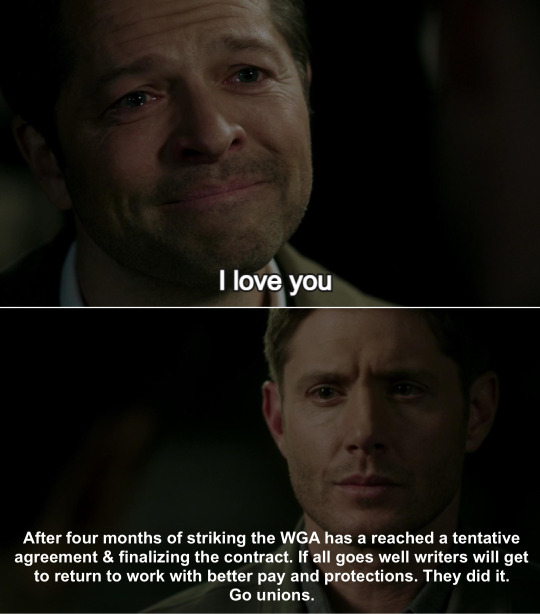
I’m so happy for them
[Image Description: Castiel from Supernatural is saying I love you, underneath is an image of Dean Winchester with the caption: “After four months of striking the WGA has a reached a tentative agreement & finalizing the contract. If all goes well writers will get to return to work with better pay and protections. They did it. Go unions”]
(Source)
#wga solidarity#wga strong#after months of watching union busting and anti union tactics#wga is coming out strong#hopefully sag is next!#writers strike#support unions#wga strike#sag strike#supernatural meme#destiel#destiel meme#workers rights#fuck the amptp#destiel news#mine#we’ve hit the note amount where people start fighting in the notes#stop fighting kids#but also the strike was absolutely necessary#withholding labor is how unions negotiate for better rights#the CEOs are multimillionaires who refused to pay proper wages#they needed to receive heavy losses so they’d actually come to the table listen to union demands
74K notes
·
View notes
Text
I will say I get the vibe that a lot of peoples interest and support for strikers is a bit too much for a vicarious ‘burn it down’ thrill, rather than for the actual goals of a strike.
Like UPS has agreed to come back to the table and it is very possible they will concede to Union demands and avert a strike. And if that happens (so long as the union does not make concessions on its key demands) it’s a good thing. It’s a victory for the laborers. It is the same ultimate conclusion that a strike would intend to produce except without the workers having to go on (not so great) strike pay for a week or two.
#I understand to an extent bc I think such a major strike would be very politically significant for the labor movement#But UPS submitting to union demands to avert a strike also accomplishes this. Maybe in a less visible way but all the same#Also on a personal note I would love to see UPS get absolutely fucked but again: strike goals are more important here
32K notes
·
View notes
Text

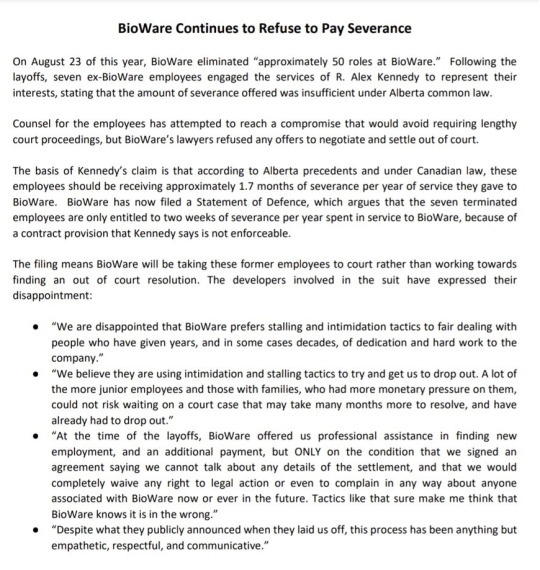



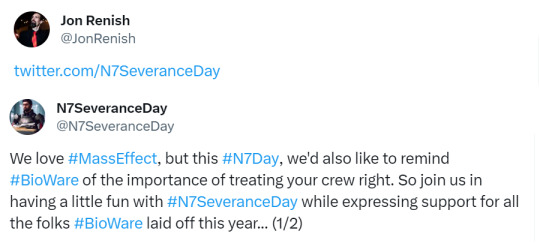


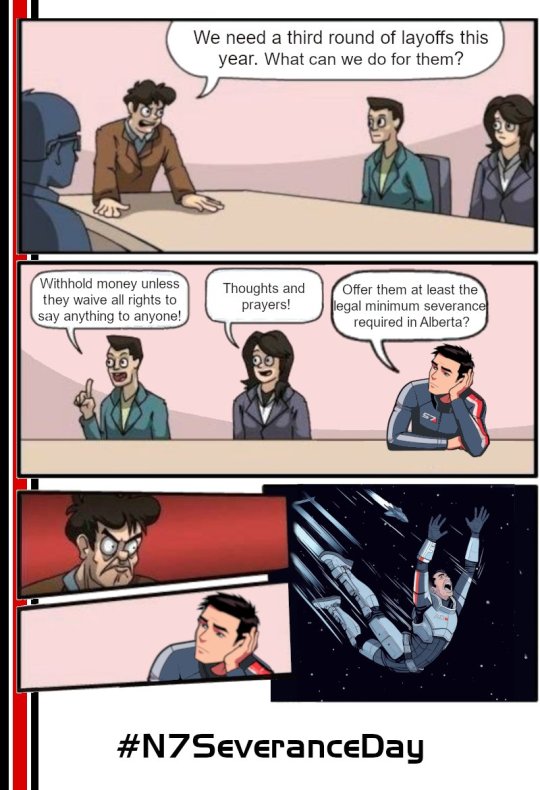



[source (Senior Reporter at Kotaku), linked Kotaku article, two, 'FC 24's performance link', three, four, @/N7SeveranceDay (source of the last two images, "Account supporting BioWare employees laid off in 2023."), five, six, Polygon tweet, Polygon article]
"BioWare Continues to Refuse to Pay Severance" statement transcript:
“BioWare Continues to Refuse to Pay Severance On August 23 of this year, BioWare eliminated “approximately 50 roles at BioWare”. Following the layoffs, seven ex-BioWare employees engaged the services of R. Alex Kennedy to represent their interests, stating that the amount of severance offered was insufficient under Alberta common law. Counsel for the employees has attempted to reach a compromise that would avoid requiring lengthy court proceedings, but BioWare’s lawyers refused any offers to negotiate and settle out of court. The basis of Kennedy’s claim is that according to Alberta precedents and under Canadian law, these employees should be receiving approximately 1.7 months of severance per year of service they gave to BioWare. BioWare has now filed a Statement of Defence, which argues that the seven terminated employees are only entitled to two weeks of severance per year spent in service to BioWare, because of a contract provision that Kennedy says is not enforceable. The filing means BioWare will be taking these former employees to court rather than working towards finding an out of court resolution. The developers involved in the suit have expressed their disappointment: - “We are disappointed that BioWare prefers stalling and intimidation tactics to fair dealing with people who have given years, and in some cases decades, of dedication and hard work to the company.” - “We believe they are using intimidation and stalling tactics to try and get us to drop out. A lot of the more junior employees and those with families, who had more monetary pressure on them, could not risk waiting on a court case that may take many months more to resolve, and have already had to drop out.” - “At the time of the layoffs, BioWare offered us professional assistance in finding new employment, and an additional payment, but ONLY on the condition that we signed an agreement saying we cannot talk about any details of the settlement, and that we would completely waive any right to legal action or even to complain in any way about anyone associated with BioWare now or ever in the future. Tactics like that sure make me think that BioWare knows it is in the wrong.” - “Despite what they publicly announced when they laid us off, this process has been anything but empathetic, respectful, and communicative.” The latest BioWare layoffs were the third round so far this year, and many of the developers affected even in earlier rounds are still searching for work, though some have started to find new positions. Regardless of employment status, the members of the current lawsuit state they remain determined to pursue BioWare in court, regardless of their employment status: - “We strongly believe that if Dragon Age: Dreadwolf does not do as well as BioWare or EA wants at launch, there will be more, even larger layoffs. Therefore, regardless of our own well-being, we believe it is important to hold BioWare responsible and get a clear decision on what settlement amount is legal. We’re no longer part of the development team, so the best way we can help our former teammates now is to hold BioWare accountable and ensure that the next group who is laid off are not treated as poorly as we were.” November 7th marks “N7 Day”, which is a fan celebration of BioWare’s Mass Effect games featuring Commander Shepard and the crew of the Normandy. The developers involved in the lawsuit are hoping N7 Day this year will be a reminder to BioWare of the importance of loyalty to your crew, and hope fans can have a little fun and help express their support with memes and images using an #N7SeveranceDay hashtag. The ex-employees involved in the suit are all based in Canada and have an average of 14 years at BioWare.”
[source]
You can express your support using the hashtag #N7SeveranceDay.
Edit: [Part 2/update] [more on the Keywords topic]
#dragon age: dreadwolf#dragon age 4#the dread wolf rises#da4#dragon age#bioware#mass effect#video games#long post#longpost#mass effect 5#signal boost#N7SeveranceDay#worker solidarity#labor rights#pls note that i did not create any of the images in this post#or the N7Severance twitter account. pls see source links
5K notes
·
View notes
Text
watch me end up making a superdad au coz of WTNS
because!!! because i was thinking about how funny it is that Bruce's first two kids (Dick and Danny) would be superman fans, and how funny it would be if that influenced his opinion on Superman when they first met. And then I got to picking that apart, and how Danny's opinion and feelings on Superman would have the bigger impact on Bruce than Dick, since Dick's admiration for Superman (presumably) comes from the standard little kid "he's an alien and he can FLY" (and flying graysons) stuff. Which, while very very cute, is easy to ignore and disallow swaying feelings on.
But DANNY? It's not the same. While part of Danny's admiration comes from the same "holy shit he's an alien and can fly thats so COOL" vein, it also comes from a place of feeling deeply relatable to him. Both he and Superman were/are perceived as incredibly powerful, deeply dangerous creatures that are nigh impossible to stop, they have a handful of powers that are similar to one another, and they are (one of) the only ones of their kind. Superman is (one of) the last Kryptonian, Danny is (one of) the only Liminal in existence, and they might not be the same species but the principle remains the same and they're in the same boat.
As a result, Danny would just, god, he'd find so much relation in that. And yeah they're not the same but Superman would make him feel just a little less alone, a little more seen, and he'd find so much comfort in that.
And Bruce, by the time he meets Superman, would know by then about Danny's powers and his experiences and his time as Phantom and as a Liminal. And it's easy to ignore your kid's admiration for another Superhero when it stems from a place of plain hero worship or simple appreciation. It's harder to ignore it when your kid admires a Superhero because they make them feel seen and relate to them on a level you can't reach them on.
When that's the reason, how could he not think differently about Superman? When, by then, he's seen the scars left on Danny's body from all of his fights; when he's seen him cry and break down over never being able to fly again thanks to the blood blossom poison; when he's heard all about the struggles he faced with his powers, the fear he had about being found out, the fear he had when he was first developing them; and how he was ostracized by his city for his efforts just because he wasn't human, despite how much he was just trying to help.
How could he not look at Superman when they first meet, mask-to-mask, and have a little voice in the back of his mind go: 'my kid is a lot like you'
its making me emotional. if these feeligns persist im going to end up making a superdad au
#dpxdc#danny fenton is not the ghost king#dpxdc crossover#dp x dc#dp x dc crossover#blood blossom au#dpxdc au#like it might not make much of an outward difference to anyone else how batman interacts with superman but WHOO boy is it there#the JLA is founded and eventually everyone starts to note that batman at least seems to *tolerate* Superman more than everyone else#and there are jokes about not even the Bat being immune to Superman's boy scout charms. and then they meet Nightingale and Robin#and both boys want to talk to Superman with stars in their eyes -- Robin being a lot more obvious with it. while his older brother lurks#nearby like a quiet shadow just like his dad. his voice softer and quieter and his questions more scientific and detail-oriented than robin#sometimes Gale's questions are more... wistful. almost. personal. in the sense that they are worded in a way that only someone who has also#flown before could ask. what it was like being on top of the clouds. if he ever got scared of falling. if he ever free fell for fun#if he ever worried that he'd fly too high and get lost coz the earth is always moving but when you're flying untethered to the axis ur#the only one not moving with them. he's very attached to superman's flying. many typically are but gale's is different.#do you ever fly out when its raining or snowing and you don't go anywhere but up just to see the rain and snow go down?#and then there are other standard questions that Superman's never even thought of. like how he doesn't have any calluses on his hands#despite what his size and stature would suggest because he's invulnerable. superman thinks about that one a lot coz it makes him sweat lmao#he remembers Gale turning to Batman and asking him if super strength would negate the need for calluses or exacerbate them since they're a#result of manual labor/working out and not necessarily a product and Batman didnt say anything at the time but Clark had the feeling that i#was going to be a topic of debate the two were going to have later. then Gale turned to Superman and said it was prolly a good thing he wa#invulnerable because that healing factor of his would clash with his ability to grow calluses and might make super strength difficult#idk what my tag count is but i might be getting close to the limit so supes cries when he finds out the full reason nightingale admires him
171 notes
·
View notes
Text


Source
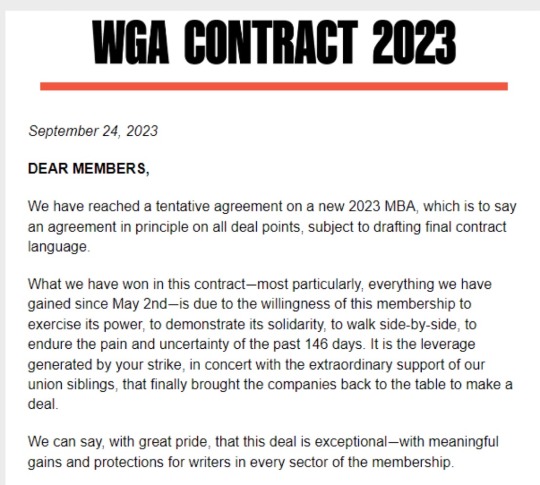
LET’S GO
#hot labor summer ending on the right note#writers strike#unions#good news#news#wga#current events#unionize#working class#solidarity#capitalism#workers rights#the left
2K notes
·
View notes
Text















FALLOUT Season One
@pscentral event 27: scenery @lgbtqcreators creator bingo: color (insp)
#falloutedit#fallout tv#fallout prime#pscentral#usergif#usercreate#userspot#tvedit#filmtvcentral#filmtvdaily#tvarchive#tvfilmsource#cinematv#filmtvedit#tusergio#tuserheidi#usersole#underbetelgeuse#chaoticroad#tusermira#tv: fallout#fo*#gifs*#long post#sorry for the amount of gifs but like#i Really did narrow this down#i originally had...checks notes.......25 scenes selected#i did my best#photoshop was dying towards the end#this was truly a labor of love
506 notes
·
View notes
Text
by god, i just want to have my silly little books, sit with my silly little thoughts, and write my silly little words
#begone with this capitalist labor cycle#notes from the field#writer#writer stuff#writers on tumblr#writers and poets#writerscommunity#writerblr#writer things#writer problems#creative writing#creative process
324 notes
·
View notes
Text
they need to invent 25k worth of fanfic that just appears fully written in your document
#[ long sigh ] i’m gonna have fun writing it#and also. barely started. i wish it was done#both cause i want to have the final product for Myself to read and because i wanna post it lmao#unfortunately the nature of this project is that i genuinely cannot post it chapter by chapter the whole thing’s gotta be done…#vignettes i love you. um. makes it so hard when i am adding them at all different points without a planned chronological order#would love to post it chapter by chapter! what if i decide that those two hundred words actually needed to be halfway through#the first chapter when i’m on chapter five :|#it’s fiiiiine i loved writing the last one that this is a second part to. but these are both labors of love goddamn#valentine notes#fanfic
115 notes
·
View notes
Note
i'm sure you've noticed me binging ur content rn but no. that's not enough. i need to eat ur blog like im digging through dirt and shoveling it into my mouth like a starved man in the light of a crescent moon. if your blog was an orange id eat it from the flesh to the seeds to the pith to the peel. i'd hike mount everest to get better wifi to scroll thru ur blog
anyways what do u think different td characters hand writing is like??

Me to this ^^^^ i fucking love it when i see people go thru my blog and like and reblog a bunch of shit i be watching the notifications and giggling
Anyways

#courtney writing for an assignment vs courtney writing down notes are very different styles of writing#the later is cramped and a bit hard to read. made for cramming in notes and plans#gwens handwriting is very floaty to me she doesnt stay on a line very well#harold writes in all caps cuz its like engineering font and he got into the habit after an random computer class he took made them learn it#duncan writes big in all caps but with weird spacing#like theres spaces where there shouldnt be and no spaces where they should sometimes if he writes fast he skips letters#<- im giving him dyslexia dw about jt#Lindseys the type of girl to write about child labor law violations with hearts around the title#justin writes like a signature 24/7#cody and trent r both just messy writers#total drama#jester draws#thanks for the ask!!!#duncan td#courtney td#dj td#alejandro td#heather td#td leshawna#harold td#td gwen#cody td#beth td#trent td#lindsay td#ugh
75 notes
·
View notes
Text

to go along with my alfie reference, here is the fullbody reference for glenn as he would be in my and @alfiefuntimes' scarecrow au! additional information about him below the cut.
following glenn's death, alfie asked lady trudy if it was possible to resurrect someone from the dead. she informed alfie that it is possible, but requires a vessel (a body to transfer the life into) and an essence (something extracted from the original body.)
alfie retrieved a scarecrow from rarold's fields and glenn's heart from neighbor (having knowledge since neighbor made an attempt on his life prior,) and through that was able to resurrect glenn and take on glenn's penance in his stead.
glenn's penance ends up being a pair of hands each month, in which glenn ends up offering up his own (and alfie sews him a new pair thereafter.) he retains the scar on his neck hidden under the ruffles on his neck, and always retains the purple thread in his chest. he has attempted to remove it various times, and is always sewn back into place via trudy substance.
#AS A NOTE!!#alfie and neighbor do have history together and the writing for their initial meetup is around 15 pages long atm i think?#nonetheless: alfie putting people's lives in danger each month is something neighbor picks up on#though he's unsuccessful at killing alfie due to how lady trudy transformed him. very long and labored but wanted to say as a disclaimer#bear.art#be kind my neighbor#bkmn#glenn harod#scarecrow glenn au#scarecrow glenn#man of straw
43 notes
·
View notes
Text
just saw somebodys rant post about how they feel disillusioned with the left because the op is materialistic & doesnt care about where the products theyre getting come from or what goes into making them & hate the way the left emphasizes the collective over the individual & thinks all philosophers are annoying idiots and i feel like the "leftists hate each other haha" in-joke has accidentally gotten to a point where we might have to start sitting people down and telling people that theyre not participating in infighting, theyre just not left-wing
#og post#people in the notes were recommending getting into ML spaces but an adversity to philosophy because you think its pretentious#will not get you far irt theory#nor will a refusal to care about the systems of labor that create the things in your life because you think its all “purity culture”#like idk man im not necessarily here to police how people describe their politics#but at a certain point you have to take a step back and think well what do i AGREE with why am i here etc#anyway the reason i saw this is because i was on their blog to block for rbing from tmras so who actually cares
37 notes
·
View notes
Text
Some more on this:





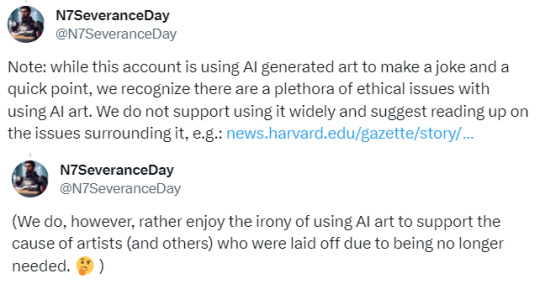

[source, two, three, four, five (Twitch, YouTube, Instagram, Twitter links), six, seven, eight, nine]
'EA on the BioWare picket tomorrow [today now]' statement transcript:
"We hope that Keywords and the union are able to resolve their differences but ultimately BioWare has no role in that process. It is our view that any activities targeting our offices are misguided as BioWare is not involved in any way in the negotiations and Epcor Tower has never been a place of employment for Keywords employees."
You can express your support using the hashtag #N7SeveranceDay.
[first post/Part 1]
#dragon age: dreadwolf#dragon age 4#the dread wolf rises#da4#dragon age#bioware#video games#long post#longpost#mass effect#N7SeveranceDay#mass effect 5#worker solidarity#labor rights#pls let me know if there's something else i should be tagging these with ^^#pls note that i did not create any of the images in this post#or the N7Severance account. pls see source links
248 notes
·
View notes
Text
did you know that one of the most notable uses of child labor/forced labor as noted by the US department of labor is toy production. is that not just the most grim thing imaginable. children of the global south suffering to make toys that are to be given to children from rich countries.
#txt#companies like hasbro/mattel/disney have specifically been noted to use sweatshop labor for their toys and merchandise
24 notes
·
View notes
Text
I will say I've seen a lot of people treat Mandalorians as good guys but I think it's really important to remember that the Mandalorians we focus on are the Warrior Aristocracy of the Imperial Core (that is to say of Mandalore itself).
And while I've seen people make the "But Mandalorians allowed anyone to become a Mandalorian" the Mandalorian code is at best a military recruitment scheme, and at worst either a lie or a tool for the destruction of the cultures of those who have been conquered by Mandalorians.
#The thing to note is that 'you can be a citizen if you sign up to serve in the military forever' is an obvious way to recruit people.#And the thing is it probably doesn't even apply to most of the people Mandalorians conquer.#It applies to the people who aren't immediately turned into slave labor...#It's really vital to remember that Mandalore is like evil evil for 90% of its history.#Like on par with the Empire possibly worse levels of evil.#They just didn't know how to make a Death Star yet.#Star Wars#Mandalorians#Mandalore
11 notes
·
View notes
Text
𝔡𝔢𝔰𝔱𝔯𝔲𝔠𝔱𝔦𝔬𝔫 𝔦𝔰 𝔪𝔶 𝔬𝔫𝔩𝔶 𝔤𝔬𝔡
explicit | lawlight | 12,179 words
L doesn’t know if what he feels for Light qualifies as love, but if not, it’s the closest he’s come since childhood, when love was easier to give. He loves Light so much that he’s planned his downfall in meticulous, retributive detail. Gone are the days of chasing Kira to an impersonal end. The moment Light stared down the barrel of his father’s gun after weeks of self-inflicted torture, his fate was sealed. * Eye for an eye, tooth for a tooth: L ends Kira’s reign using his own weapon against him.
#death note#lawlight#l lawliet#light yagami#my stuff#this was a labor of love#much like L i enjoy making that evil twink suffer
16 notes
·
View notes